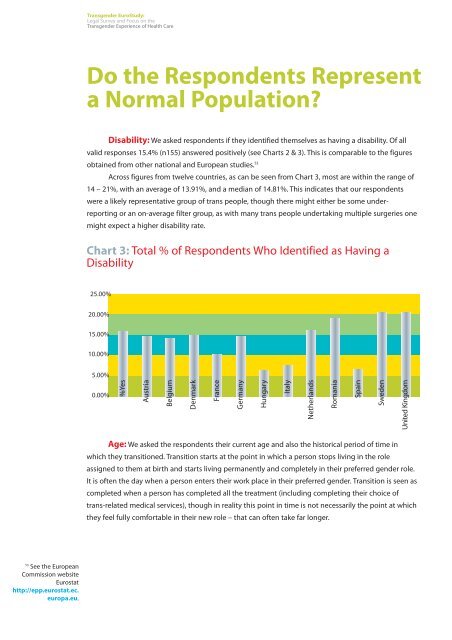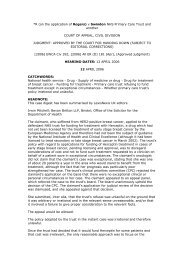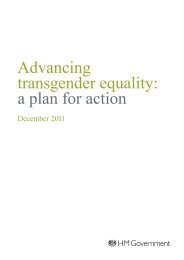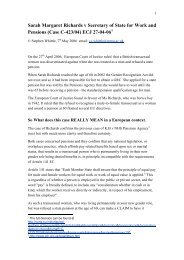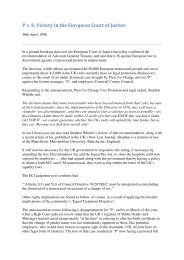Transgender EuroStudy â Legal Survey and Focus ... - ILGA Europe
Transgender EuroStudy â Legal Survey and Focus ... - ILGA Europe
Transgender EuroStudy â Legal Survey and Focus ... - ILGA Europe
You also want an ePaper? Increase the reach of your titles
YUMPU automatically turns print PDFs into web optimized ePapers that Google loves.
<strong>Transgender</strong> <strong>EuroStudy</strong>:<br />
<strong>Legal</strong> <strong>Survey</strong> <strong>and</strong> <strong>Focus</strong> on the<br />
<strong>Transgender</strong> Experience of Health Care<br />
Do the Respondents Represent<br />
a Normal Population<br />
Disability: We asked respondents if they identified themselves as having a disability. Of all<br />
valid responses 15.4% (n155) answered positively (see Charts 2 & 3). This is comparable to the figures<br />
obtained from other national <strong>and</strong> <strong>Europe</strong>an studies. 53<br />
Across figures from twelve countries, as can be seen from Chart 3, most are within the range of<br />
14 – 21%, with an average of 13.91%, <strong>and</strong> a median of 14.81%. This indicates that our respondents<br />
were a likely representative group of trans people, though there might either be some underreporting<br />
or an on-average filter group, as with many trans people undertaking multiple surgeries one<br />
might expect a higher disability rate.<br />
Chart 3: Total % of Respondents Who Identified as Having a<br />
Disability<br />
25.00%<br />
20.00%<br />
15.00%<br />
10.00%<br />
5.00%<br />
0.00%<br />
%Yes<br />
Austria<br />
Belgium<br />
Denmark<br />
France<br />
Germany<br />
Hungary<br />
Italy<br />
Netherl<strong>and</strong>s<br />
Romania<br />
Spain<br />
Sweden<br />
United Kingdom<br />
Age: We asked the respondents their current age <strong>and</strong> also the historical period of time in<br />
which they transitioned. Transition starts at the point in which a person stops living in the role<br />
assigned to them at birth <strong>and</strong> starts living permanently <strong>and</strong> completely in their preferred gender role.<br />
It is often the day when a person enters their work place in their preferred gender. Transition is seen as<br />
completed when a person has completed all the treatment (including completing their choice of<br />
trans-related medical services), though in reality this point in time is not necessarily the point at which<br />
they feel fully comfortable in their new role – that can often take far longer.<br />
53<br />
See the <strong>Europe</strong>an<br />
Commission website<br />
Eurostat<br />
http://epp.eurostat.ec.<br />
europa.eu.


